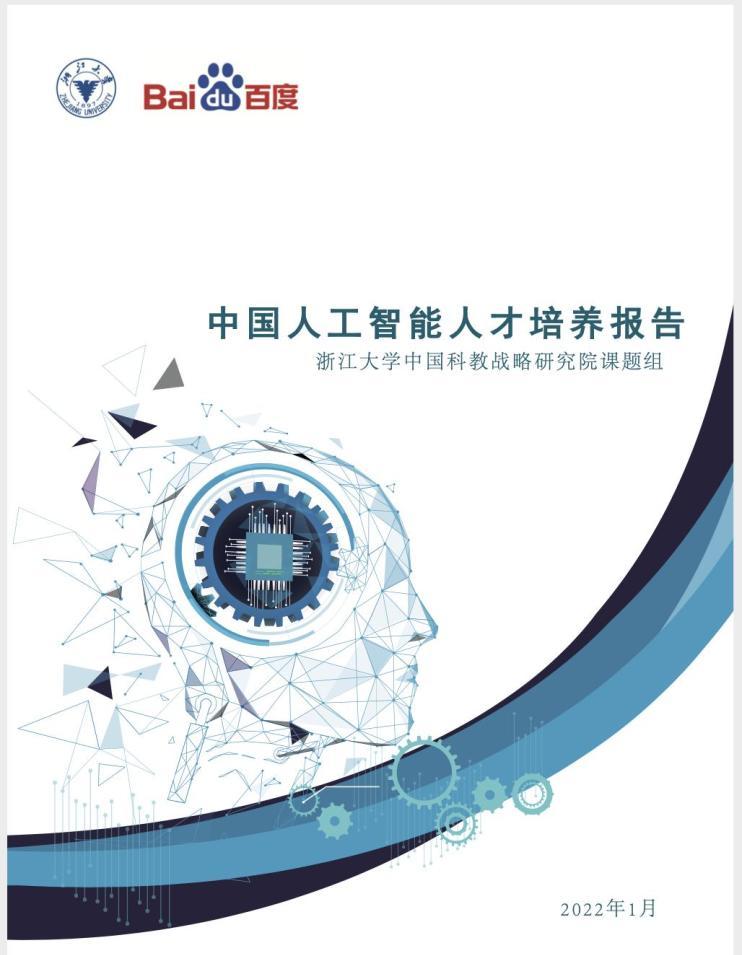On January 25, Baidu and the China Academy of Science and Education Strategy of Zhejiang University released the "White Paper on the Cultivation of Intelligent Talents for Chinese Workers" (hereinafter referred to as the "White Paper"), which systematically sorted out the current situation and trend of the development of artificial intelligence talents at home and abroad from the perspectives of supply and demand, training mode, problems and countermeasures for the training of artificial intelligence talents, clarified the urgent problems to be solved in the training of artificial intelligence talents in the mainland, and further proposed the development ideas of building an integrated artificial intelligence talent ecosystem of government, industry, academia and research.

The "White Paper" has a total of nearly 50,000 words, and is divided into five chapters to elaborate on the iterative trends and characteristics of the global artificial intelligence industry, the current situation analysis of the development of global artificial intelligence talents, the current situation, model and key issues of the training of intelligent talents in Chinese, and the construction of an integrated artificial intelligence talent ecosystem and policy suggestions for government, industry, academia and research.
At the press conference, Zhang Wei, vice president of the China Academy of Science and Education Strategy of Zhejiang University, made a detailed interpretation of the "White Paper" and pointed out that there are still some shortcomings in the cultivation of artificial intelligence talents in the mainland, which are mainly manifested in the following three aspects: First, from the overall point of view, we have the problem of insufficient total amount and structural imbalance; second, there is a disconnect between theory and practice in the training of artificial intelligence talents in colleges and universities, especially the lack of high-level artificial intelligence course construction experience, the lack of massive high-quality data and computing resources. Lack of advanced practical teaching resources, lack of cutting-edge teachers, lack of suitable learning tools, etc.; Third, the training of enterprise artificial intelligence talents has not yet formed an effective closed-loop ecosystem, such as the systematization and systematization of enterprise artificial intelligence talent training is not in place, there are a large number of "simple platter" phenomenon, and the cultivation of domestic top artificial intelligence enterprises also has the problem of excessive dependence on foreign ecology. "On the whole, the cultivation of artificial intelligence talents in the mainland urgently needs to build an artificial intelligence talent training ecosystem based on the integration of deep industry and education." Zhang Wei said.
Zhang Wei, vice president of the China Academy of Science and Education Strategy of Zhejiang University, shared remotely
For the leading enterprises in Chinese intelligent technology, the urgent problems to be solved in the teaching of artificial intelligence education in colleges and universities, such as the understanding of THE application of the AI industry, the lack of computing power and data resources, are precisely the advantages that enterprises are good at.
Ji Xiangting, deputy director of Baidu's University Cooperation Department, said that the "whole academic section" from K12 to universities to social developers, and the artificial intelligence talent training system that reconstructs the "comprehensive coverage" of all walks of life, have become the focus of strategic competition for AI talent training in various countries. At the same time, the more accurate and more subdivided AI talent training "differentiation" model has also become the current mainstream trend. "With its rich data, computing power and technical resources, Baidu has long been deeply involved in the cultivation of artificial intelligence talents, forming an integrated AI talent training ecosystem including strategic cooperation between universities, scientific research cooperation, professional co-construction, teacher training, textbook publishing, technology competitions, practice bases, campus activities, etc., and is committed to achieving the strategic goal of 'Baidu will cultivate 5 million AI talents for the society in the next five years'."
Ji Xiangting, deputy director of Baidu University Cooperation Department, delivered a speech on the spot
In view of the problems of the quantity, structure and quality of talents facing the current development of artificial intelligence, the "White Paper" proposes to build an integrated artificial intelligence talent ecosystem based on hierarchical classification, with deep industry-education integration as the main feature, and government support as the strong support.
The "White Paper" pointed out that in the foreseeable future, China's artificial intelligence market demand is very large, so it is more necessary to support and promote the development of the Chinese intelligent industry, especially in the era of artificial intelligence, which needs talents who know more creativity, cross-border, openness, cooperation and sharing, and more close cooperation between schools and enterprises to cultivate composite AI talents based on the needs of industrial intelligence and combining theory and practice. (Zhongxin Jingwei APP)